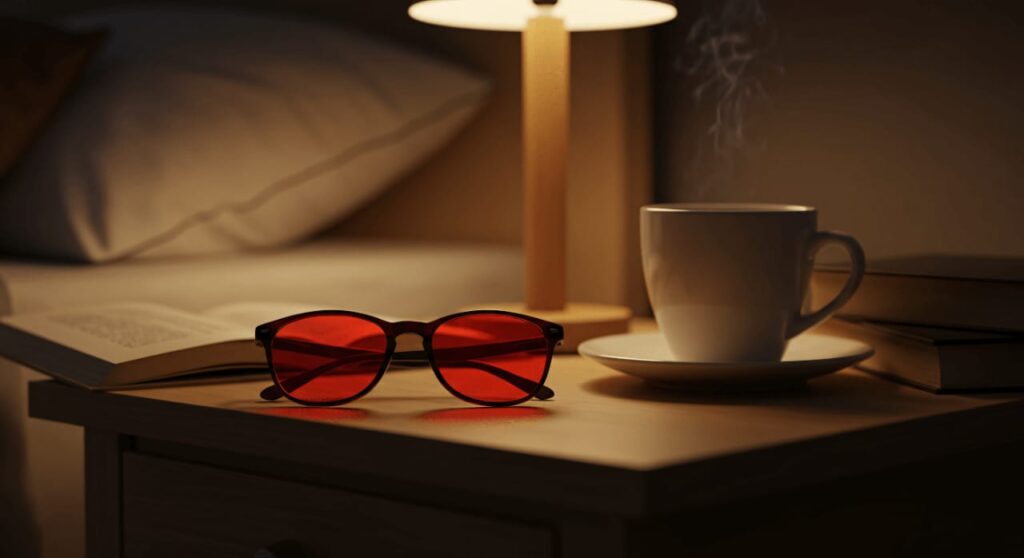If you’re someone who’s ever found themselves lying in bed, scrolling through your phone or finishing up work on a laptop late at night, you know the struggle: your mind is tired, but your body just won’t drift off. These days, with digital screens and LED lights surrounding us at every turn, achieving a good night’s sleep can seem more challenging than ever. But what if a simple pair of glasses or Nighttime Glasses could help you reclaim your nights and wake up feeling truly refreshed?
Step into the world of night glasses for sleep—a rising trend among those looking to improve their nightly rest naturally. In this article, I’ll break down the science behind nighttime glasses and compare several top options using real-world performance data—so you can easily find the pair that fits seamlessly into your nightly routine.
Why Do Nighttime Glasses Matter?
Let’s face it: most of us are glued to screens well after sunset. Whether it’s catching up on emails, binge-watching a favorite show, or just unwinding with social media, all that
artificial light can wreak havoc on our sleep. The main culprit? Blue and green light (roughly 400–570nm), which suppresses melatonin—the hormone that tells your body it’s time to sleep.
Studies show that when you’re exposed to blue light at night, it often takes longer to fall asleep, your sleep isn’t as restful, and you’re more likely to wake up feeling groggy the next day. Because of this, more and more people are turning to glasses for nighttime screen use as an easy way to support better sleep—without having to give up their favorite evening activities.
Types of Night Glasses: What’s on the Market?
Not all blue light filtering eyewear is created equal. Here’s a quick rundown of what you’ll find:
Amber/Orange Tinted Glasses for Sleep
- How they work: These Nighttime Glasses filter out most blue light (up to about 500nm), offering a good balance between color perception and protection.
- Best for: Evening relaxation, reading, or moderate screen use before bed.
- Typical users: People who want to ease into better sleep habits without a dramatic change in how everything looks.
Clear or Lightly Tinted Blue Blockers for Sleep
- How they work: These block only a portion of blue light (often 10–40%), making them better for daytime use than as a primary sleep support tool.
- Best for: Reducing digital eye strain and headaches during the day.
Red Sleep Glasses (Red Lens Glasses for Sleep)
- How they work: Red lenses block both blue and green light, often up to 570nm, which covers the full spectrum most disruptive to melatonin production.
- Best for: Maximum sleep support, shift workers, those with chronic insomnia, or anyone highly sensitive to light at night.
- Typical users: People serious about optimizing their sleep, biohackers, or those struggling with persistent sleep issues.
How to Pick Sleep Glasses: What Really Matters?
With so many options, it’s easy to get overwhelmed. Here’s what to keep in mind when shopping for the best night glasses 2025:
- Wavelength Coverage: For true sleep benefits, look for Nighttime Glasses that block both blue and green light up to at least 550nm—ideally 570nm. Red lenses are the gold standard here.
- Lens Color: Amber and orange are great for early evening, while deep red is best for pre-bedtime use and maximum melatonin support.
- Comfort & Fit: Lightweight frames, spring hinges, and flexible materials make a big difference for nightly wear.
- Style & Durability: Choose a pair you’ll actually want to wear. Durable materials and classic designs (like Gloojo’s Wayfarer frame) help ensure your glasses last and look good.
- Price & Value: More expensive doesn’t always mean better. Look for lab-tested performance and real user reviews.
Comparing the Top Night Glasses for 2025
Below is a side-by-side chart of leading blue light filtering eyewear. This makes it easy to see which pair fits your needs and budget.
*Data primarily sourced from optimizeyourbiology Blue Blocker Database.
Everyday Scenarios: Where Night Glasses Make a Difference
Imagine you’re finishing a big project on your laptop at 10 p.m. or winding down with your favorite Netflix series. Maybe you’re a shift worker who needs to sleep during the day, or you like to read on your tablet before bed. In all these cases, blue and green light from screens and overhead LEDs can trick your brain into thinking it’s still daytime, making it harder to fall asleep and stay asleep.
Wearing night glasses for sleep in these situations helps your body recognize that it’s time to wind down. You’ll likely notice you get sleepy faster, fall asleep more easily, and wake up feeling less groggy—even after a late night.
Spotlight: Night Ease Red Lens Glasses—What Sets Them Apart?
Among the many options, the Night Ease Red Lens Glasses stand out for several reasons:
- Full-Spectrum Blocking: These glasses filter out over 99.9% of blue light (400– 500nm) and 99.35% of green light (500–570nm). That’s about as good as it gets when it comes to shielding your melatonin levels and helping your body maintain a healthy sleep-wake rhythm.
- Science-Backed Results: Lab testing and user feedback consistently show that Night Ease Red Lens Glasses help people fall asleep faster, experience deeper sleep, and wake up feeling more refreshed.
- Stylish & Comfortable: The classic Wayfarer frame is lightweight (just 24.7g), flexible, and fits comfortably for hours of evening wear. You can choose from classic black or modern transparent finishes.
- Versatile Use: Perfect for nighttime reading, meditation, yoga, or post-exercise recovery—any situation where you want to relax and prepare for sleep without giving up your favorite activities.
- Affordable & Accessible: At $69, they offer premium performance at a fraction of the price of some competitors, making advanced sleep support tools accessible to more people.
Real User Stories:
Many users report that after incorporating Night Ease Red Lens Glasses into their evening routines, they fall asleep faster, wake up less during the night, and feel more alert in the morning. One user shared, “I used to struggle with falling asleep after working on my laptop at night. Since wearing these glasses, I find myself getting drowsy much faster!” Another said, “The red lenses are a game-changer. I no longer wake up feeling groggy, and my sleep has been much deeper.”
Beyond Sleep: Other Benefits of Night Glasses
- Reduced Eye Strain: If you spend hours on digital devices, blue light filtering eyewear can help reduce dryness, irritation, and fatigue.
- Better Mood: Improved sleep quality often leads to better mood and mental clarity the next day.
- Support for Shift Workers and Travelers: Night glasses are a must-have sleep support tool for anyone with an irregular schedule or who travels across time zones.
- Natural, Non-Pharmaceutical Solution: Unlike sleep aids or supplements, night glasses work with your body’s natural rhythms and have no side effects.
Final Tips: How to Make Night Glasses Part of Your Routine
- Wear Them 1–2 Hours Before Bed: For best results, put on your night glasses as you start your evening wind-down—whether that’s watching TV, reading, or doing chores under bright lights.
- Be Consistent: Make them part of your nightly routine, just like brushing your teeth.
- Pair With Good Sleep Hygiene: Dim your lights, avoid caffeine late in the day, and keep your bedroom cool and comfortable for even better results.
The Bottom Line
Getting quality sleep in our always-on world can be tough, but it’s not impossible. The right pair of night glasses for sleep can help you beat the effects of late-night screen use, support your natural circadian rhythm, and wake up ready to take on the day.
Whether you’re looking for the best night glasses 2025, want to know how to pick sleep glasses, or just need a simple, effective sleep support tool, there’s a solution out there for you.
If you want maximum protection that’s truly supported by science, red lens glasses are a smart choice. You’ll notice a real improvement in your sleep—and you won’t have to give up comfort or style to enjoy the benefits. Try them as part of your nightly routine and see the difference for yourself—your future, well-rested self will thank you.







